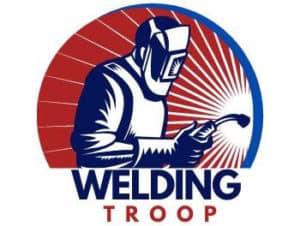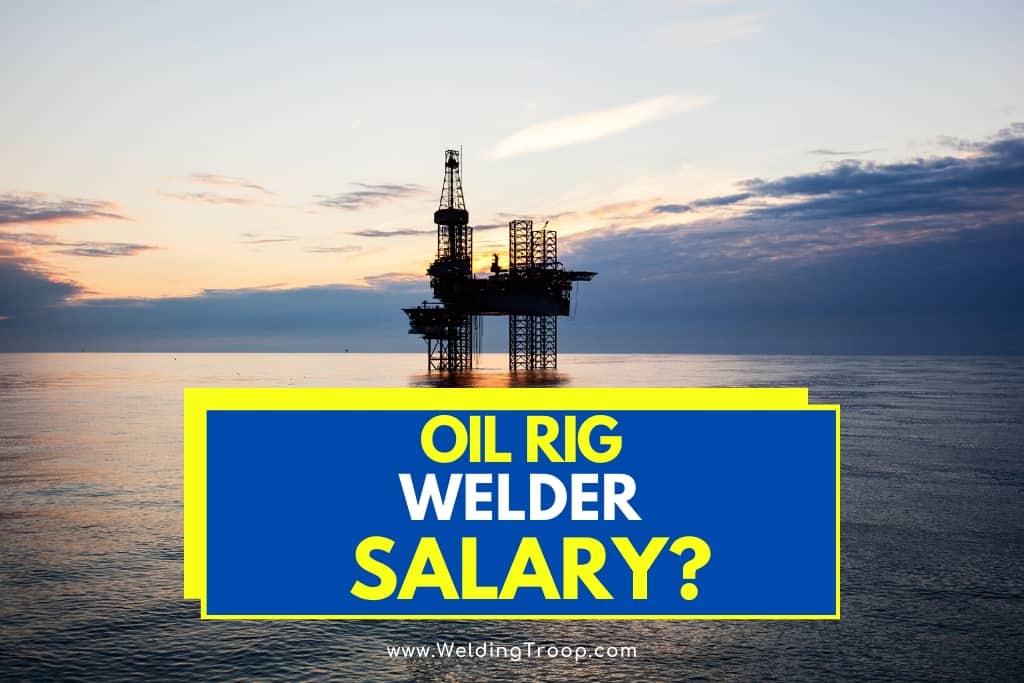In 2018, the United States’ oil and gas industry generated 181 billion dollars. If you’re a welder or considering taking up the trade, you may wonder how you can take home a slice of that pie and how big that slice will be. The good news is that welders are an essential part of the oil drilling process. Oil rigs need talented welders to maintain structural integrity and repair any damages in a timely manner and—best of all—they’re willing to pay for it.
How much does an oil rig welders make? Average pay for oil welders across the country is about $70,000 per year. While salaries start between $40,000 and $60,000 per year, with the right skills, experience, and certifications, welders can make as much as $200,000 annually working on oil rigs.
Like any career, how much money you make will depend ultimately on how valuable you are to the company you’re working for. There are lots of things you can do to increase your value as a worker and therefore increase your pay. Let’s go through them.
Table of Contents
What Affects Oil Rig Welder Salary
There’s a wide range of oil rig welder salaries. If you want to end up on the higher end of the spectrum, there are a few things that you’ll want to consider.

Experience
This one is simple. You’ll make less money your first year welding for oil rigs than your tenth. However, if you’ve got experience welding in other areas, you may be able to start closer to the top as many of these skills will translate. Experience alone can get you into six figures, making a hundred thousand dollars a year. Work hard, put in your time, and the money will come to you.
Skills
On a basic level, the better welder you are, the better wages you’ll be able to command. However, the big money comes in if you can do things that no one else can do. The biggest thing you can do to increase your value as an oil rig welder is to become an underwater welder.
Oil rigs are seated right in the ocean and are susceptible to damage even beneath the water’s surface. Cracking, warping, and bending can all occur underneath the water. These underwater sections are critical to the support structure of the rig and need to be dealt with quickly and effectively.
Underwater welding is dangerous, difficult, and highly technical, but also crucial to the success of the rig. For all these reasons, underwater welders make the most money of any oil rig welders, and putting on a diving suit is the only way you’ll come anywhere close to the $300,000 per year benchmark.
Know how to weld but not how to dive? Don’t count yourself out yet; it’s much more common for welders to learn how to dive than for divers to learn how to weld. Start taking some lessons; it could pay off in a big way.
Related Article: Offshore Underwater Welding Jobs: Description and Salary Details
Certifications
Proper certifications are almost more of a permission to play than a way to boost your salary. The American Welding Society – AWS – certifies welders. Getting your certification will demonstrate to potential employers that you have the knowledge, training, and understanding of safety regulation to do the job.
Adding specialty certifications can give you added value as a welder allowing you to find a niche you enjoy and increase your pay. Pipeline certifications may be particularly valuable as this is a related field, and oil rig welders routinely weld pipe and pipelines.
Location
Look, you can’t rig weld if there are no rigs to weld on. The availability and pay of rig welding jobs varies wildly from state to state. Generally speaking, you’ll make the most money and have the best shot of finding work where the oil is. Texas, West Virginia, Pennsylvania, North Dakota, and Alaska are all oil rig hotspots.
If you’re willing to relocate, you can head to the places that have the most or the most lucrative work. This is known in the industry as “chasing” drilling rigs. If you’re willing to pack up and move to the next job site the moment a better offer comes along, you can ride the wave of changes in oil production and availability, greatly increasing your earnings.
What part of the country you’re in isn’t the only location aspect to consider. Some drilling companies offer offshore positions. These positions include lodging and meals while you’re working on site. This will cut down on your expenses and increase how much of your pay stays in the bank account.
Related article: Where Do Welders Work?
Employer
There are a few different ways to enter the industry as a rig welder. You can be hired to work on a rig as an employee of the oil company, as an employee of a contractor, or as an independent contractor. Deciding how you want to approach the industry can greatly affect how much money you make.
Independent contractors make more than employees. If you’re strictly comparing paychecks, they make a lot more. Independent contractors make around $75 per hour. That sounds like big bucks, but there’s more to consider. Independent contractors don’t get the same benefits as employees.
Related article: Advantages of Being a Welder >>Salary, Working Hours | Worklife Balance
You won’t get health insurance, paid vacation, sick days, or workman’s comp. You’ll have to pay for these things out of pocket. You’ll also need to pay for all your own equipment and the costs associated with keeping all of that in good repair.
In addition, most oil rigs will require a million-dollar or more liability insurance policy to protect their rig and equipment if you were to be responsible for an accident.
If you were to break something and you didn’t have the insurance, they wouldn’t be able to sue you for a million dollars. You would go into bankruptcy, and they would only claim a sliver of what they’re owed. For this reason, they won’t even let you near the rig without liability insurance.
If you’re going the independent contractor route, you’ll need to think about taxes. You’ll want to set up an LLC or something similar as a way to correctly file taxes for your new small business. Paying taxes as a small business owner can be complicated.
You’ll likely want to invest in an accountant to ensure that you’re filing correctly and writing off everything you’re legally able to. Also, be sure not to blow your paycheck every week. Taxes won’t get deducted automatically and won’t get paid until you pay them. If Tax season rolls around and your bank account is empty, you’re in for a rude awakening.
Even with these costs, you can make more money as an independent contractor than as a payroll employee. You just need to be aware of the additional costs and the added risk you’re taking on. However, lots of oil rig welders are attracted to the profession, specifically because of the freedom they feel from being able to be their own boss.
Lifestyle
There’s more to consider than just the pay of a position. Oil rig welding is not easy work by any means. Oil rig welders generally work six-day weeks, ten hours a day. Rig welders who work offshore—long, or short term—often spend lots of time away from home and away from their families. The work is rigorous and physically demanding.
Before you invest too much into becoming an oil rig welder, be sure that the job is going to mesh with your lifestyle. If you’re prepared for the challenges of oil rig welding, then you can make a living being a part of an industry that keeps America moving.

Recommended Reading
What Type of Welding Is Used in Underwater Welding? How Does It Work?
7 Steps for Avoiding Electric Shock When Welding Underwater
Offshore Underwater Welding Jobs: Description and Salary Details
Here are some of my favorite tools & equipment´s
Thank you for reading this article. I hope it helps you find the most recent and accurate information for your welding project. Here are some tools that I use daily and hope you´ll also find helpful.
There are affiliate links, so if you do decide to use any of them, I´ll earn a small commission. But in all honesty, these are the exact tools that I use and recommend to everyone, even my own family. (NO CRAP)
To see all my of most up-to-date recommendations, check out this resource that I made for you!


